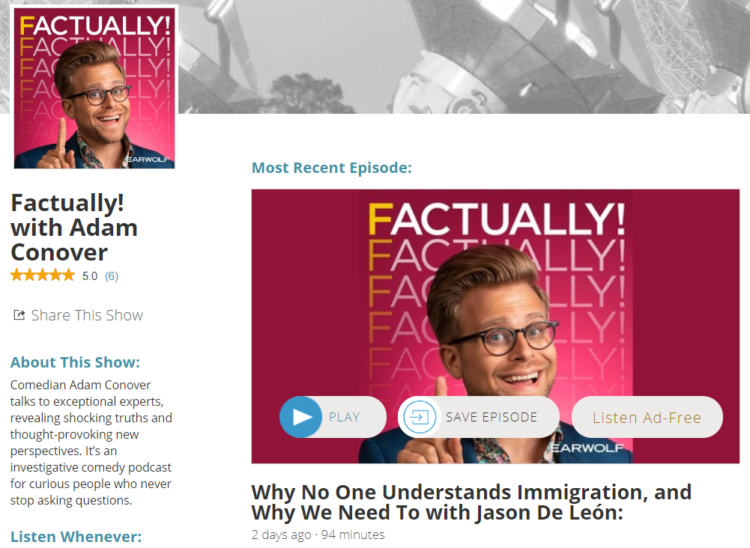SEO for Podcasts

Podcasts are becoming more and more popular with every year. This form of communication between creators and recipients originated in the United States and has been winning users’ hearts for a long time.
Podcasts – what are they and how to use them to your advantage?
Podcasts are very often recorded by bloggers who have noticed that the popularity of lengthy written texts is decreasing year by year. It’s much easier to find time to listen to a podcast devoted to the subject you’re interested in than to read a few pages long article. Moreover, it’s possible to listen to audio content while performing everyday activities such as driving, running, cleaning or cooking which is also its great asset.
Apart from providing news and information about the world, podcasts may be also perceived as a form of entertainment. They probably owe their renown to accessibility and the fact that they’re free. Creators usually ensure that individual episodes of the podcasts are published not only on their websites but also on platforms like YouTube, Spotify or iTunes.
Usually podcasts are recorded as monologues or interviews. In the latter case, the presenter invites guests and together they elaborate on given topics in detail.
Of course many people use the abovementioned popular platforms to listen to podcasts that are of interest to them. However, in this entry we’ll tell you how to make sure that users get to your website directly from Google. Keep reading!
Doing SEO for podcasts starts even before recording them
Be prepared to do SEO for your podcasts even before recording them. It’s necessary that your podcasts contain all crucial keywords. Keep your recordings moderate and limit the number of keywords to a few (2-3) the most important ones that suit the subject matter best.
Why so few? To avoid content cannibalization which in this situation means that a given episode of your podcast fights for positions on Google with your other episode. If you take into consideration that most podcasts are created by experts in given fields, it becomes obvious that these professionals constantly discuss aspects that are somehow interlinked.
But why should you include keywords in your podcasts? Wouldn’t that be enough to place them in the title or description of a given episode? Not really.
Google robots are able to analyze not only written texts but also audio content. And even if this principle doesn’t work ideally in your country yet, it’s still worth complying with it as the algorithm is constantly updated. Therefore, if you want to be consistent, first you need to include keywords in the recording and then incorporate them in the description.
Many people forget about using the word “podcast”. Well, for you and users it might be obvious that the recording they’re listening to is a podcast so why should you write about it? As you can probably guess, you ought to do it to let Google know how to interpret your content. Moreover, listeners usually look for podcasts by entering phrases like “podcasts cooking” or “podcasts about cooking” so if placing this word on your website will have a positive impact on your position in the search results.
What to do after the podcast is recorded?
1. Subpages
You need to ensure that every episode of your podcast is published on a separate subpage. This is the necessary requirement to be ranked high in the search results. Therefore, remember about a dedicated subpage with an appropriate URL (go to our previous article to learn how to build friendly URLs), a header and description listing the most important points discussed in the podcast.
2. Graphics
You’re probably perfectly aware that both Google and users love graphics. As a result, every episode of your podcast should be accompanied by a matching image (go to our article to find out how to do SEO for images). You can use a file downloaded from a free photo bank or publish a photo showing you in the company of a guest invited to a particular episode.
3. Headers and space for comments
As we’re talking about guests, if your podcast features famous persons don’t hesitate to list their names in its title and H1 header. Mentioning renowned personas may help you attract new potential listeners who will be searching for information about them.
It’s advisable to place a keyword in the title of your podcast if you manage to make it look natural. Users should have the possibility to leave comments under your recordings.
4. Social media
Whenever you publish a new episode of your podcast on the website, write about it on social media. Use your Facebook, Twitter or LinkedIn profile to create posts linking to your website. Remember to diversify your posts as Google doesn’t like duplicate content.
5. Content categorization
Since you publish each episode of your podcast on a separate subpage, it’s worth implementing categories to which you’ll assign particular recordings. Apart from making it easier for users to browse through the content, you’ll also gain recognition from Google robots.
Provide transcription for bots and for users’ convenience
At the beginning of this article we’ve stated that Internet users love podcasts because they don’t want or don’t have enough time to read. And now we’re about to encourage you to publish a long text. Why? Does it make any sense?
First and foremost, it’s been known for a long time that Google appreciates websites with a lot of content. Second of all, not everybody likes listening to recordings. Some people assimilate information better when they have text in front of their eyes. Sometimes, users can’t listen to podcasts because they don’t have headphones at their disposal. However, the greatest advantage of providing podcast transcriptions is the fact that thanks to them users can easily access key information that is of interest to them.
Transcribing the whole episode of your podcast is the best solution. Of course, preparing the transcription is rather time-consuming, however, you can always commission it to someone else. This way, the recording and the written text will be equally valuable for users and Google robots.
Transcription, as any other text, should be optimized in accordance with SEO guidelines. It needs to be divided into paragraphs, you should also insert headers and bold keywords. Thanks to it, Google will evaluate your site better and users will quickly find the necessary passages.
If for some reason you don’t want to write the transcription, you should publish a short note under the recording that would list meaningful quotes, conclusions and all the key aspects discussed in the podcast. Such activities can positively affect your SEO process and encourage users to listen to your whole podcast.
To sum up
Although doing SEO for podcasts doesn’t differ much from doing SEO for blog posts, it’s still worth becoming acquainted with the tips presented above. They’ll certainly help you make the most of the increasing popularity of this type of media. Do your best to create episodes with valuable content that will be pleasant to listen to. Then, you can be sure that users will start commenting and sharing the podcast which will attract new visitors to your site and improve your position in the search results.




